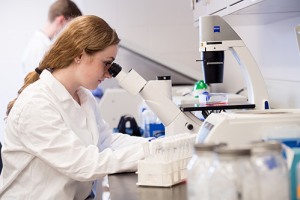Research
The Program in Biology exposes undergraduates to research through practical training, courses, and opportunities for independent study with faculty pursuing cutting edge-science in a variety of fields.
Research
The Program in Biology exposes undergraduates to research through practical training, courses, and opportunities for independent study with faculty pursuing cutting edge-science in a variety of fields.
Overview of Research in Biology at Brown
Research and experiential learning are valuable and rewarding experiences for undergraduates, no matter what the longer-term career plans may be.
What is Research?
SciToons at Brown explores a range of approaches to research--and the fundamental goal that unites them all.
Research Ethics
You may already be familiar with what research is, but what defines good research? Ethics help answer this question.
Research Timeline: Years 1-4
For students seeking the ScB degree, research is a requirement. For students in an AB program, research for credit is an option. For projects carried out over a longer period that take substantive shape, a senior honors thesis is a possible outcome.
First-year students have the opportunity to experience research through the BIOL 0190 Phage Hunters. Our course BIOL 0100, Living Biology at Brown & Beyond, introduces students to the breadth of research underway across The Division and arms students with a suite of skills to help them secure positions in faculty member labs.
To Do: In preparation for research in a faculty member’s lab, first year students are strongly encouraged to participate in a Lab Techniques Workshop (described below). Annually (even year fall semesters), the BUE Office offers the Finding, Securing and Succeeding at Research Workshop for undergraduates. This is especially ideal for first year and sophomore students. Join the BUE Email List or follow us on the social media for announcements about these workshops.
Sophomores and Juniors forge connections with campus-based and clinical faculty to begin exploring and experiencing research in their field of interest. Sophomore seminars such as Life in a Shell, Viral Epidemics, and Rhode Island Flora offer active learning opportunities that help students practice the critical thinking necessary for independent research. Inquiry based courses such as Inquiry in Biochemistry and Inquiry in Plant Biology use group work to orient students to the development of novel scientific questions and accompanying methods.
To Do: Students are encouraged to pursue BEARCORE training at the onset of research in a faculty member’s lab. BEARCORE is offered only in spring and ideal for sophomore or junior year.
Juniors and Seniors pursue more independent research with campus and clinical faculty. Students intending to develop a senior thesis will typically commit the final summer and last two academic semesters to the research project.
To Do: Check out funding opportunities. Learn more about honors theses. Each spring, seniors are welcome to present their research in the Biology Senior Research and Capstone poster event.
Preparing for Research: Foundations of Lab Techniques Workshop
At the start of each semester the Multidisciplinary Teaching Laboratories (MDL) offers a Foundations of Lab Techniques Workshop for undergrads. The workshop is designed to introduce basic laboratory skills and techniques to undergraduate students before they begin working in a faculty member’s lab, in preparation for independent study, or for summer UTRA opportunities. MDL technicians tailor the two-hour session to the skill level of the students.
The following topics are covered:
- Guidelines for keeping a lab notebook;
- Good laboratory practices;
- Use of balances, centrifuges and autoclaves;
- Using a microscope;
- Dilutions;
- Making solutions;
- Pipetting and assessing accuracy of pipetting technique;
- Using balance and preparing a simple solution;
- Sterile technique (including auto pipetting); and
- Sterile transfer of reagents in a hood.
Upcoming workshops at the Biomedical Center in these techniques will be facilitated by the MDL each semester, consisting of an asynchronous component featuring content through Google Classroom followed by an in-person lab practical component to master the hands-on, technical skills presented. If you're interested in participating in the workshop, please join the BUE email list for registration announcements.
Join the BUE Email List for registration announcements
Finding Research
Biology students find research opportunities in a number of ways. Many students find research opportunities with faculty by talking with Professors they have taken a course with, seeking direction from the BUE Advising staff or their concentration advisor, or by searching for key areas of interest on Researchers@Brown.
Every fall semester the BUE offers a workshop How to Find, Secure, and Succeed in Research. We will announce this event through email, social media and Today@Brown.
